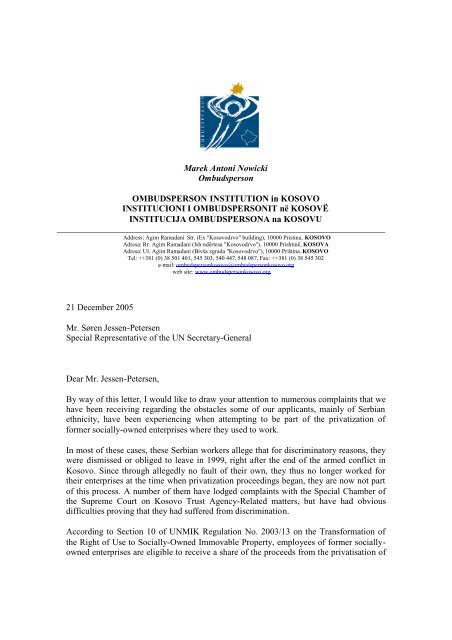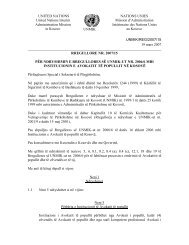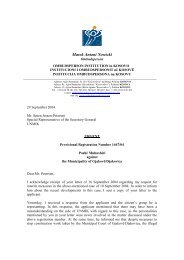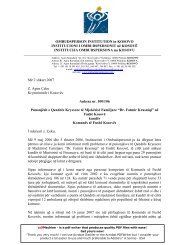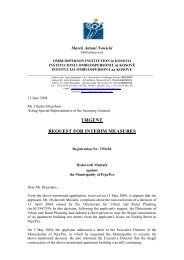Marek Antoni Nowicki Ombudsperson OMBUDSPERSON ...
Marek Antoni Nowicki Ombudsperson OMBUDSPERSON ...
Marek Antoni Nowicki Ombudsperson OMBUDSPERSON ...
You also want an ePaper? Increase the reach of your titles
YUMPU automatically turns print PDFs into web optimized ePapers that Google loves.
<strong>Marek</strong> <strong>Antoni</strong> <strong>Nowicki</strong><br />
<strong>Ombudsperson</strong><br />
<strong>OMBUDSPERSON</strong> INSTITUTION in KOSOVO<br />
INSTITUCIONI I <strong>OMBUDSPERSON</strong>IT në KOSOVË<br />
INSTITUCIJA <strong>OMBUDSPERSON</strong>A na KOSOVU<br />
__________________________________________________________________________<br />
Address: Agim Ramadani Str. (Ex "Kosovodrvo" building), 10000 Pristina, KOSOVO<br />
Adresa: Rr. Agim Ramadani (Ish ndërtesa "Kosovodrvo"), 10000 Prishtinë, KOSOVA<br />
Adresa: Ul. Agim Ramadani (Bivša zgrada "Kosovodrvo"), 10000 Priština, KOSOVO<br />
Tel: ++381 (0) 38 501 401, 545 303, 540 447, 548 087, Fax: ++381 (0) 38 545 302<br />
e-mail: ombudspersonkosovo@ombudspersonkosovo.org<br />
web site: www.ombudspersonkosovo.org<br />
21 December 2005<br />
Mr. Søren Jessen-Petersen<br />
Special Representative of the UN Secretary-General<br />
Dear Mr. Jessen-Petersen,<br />
By way of this letter, I would like to draw your attention to numerous complaints that we<br />
have been receiving regarding the obstacles some of our applicants, mainly of Serbian<br />
ethnicity, have been experiencing when attempting to be part of the privatization of<br />
former socially-owned enterprises where they used to work.<br />
In most of these cases, these Serbian workers allege that for discriminatory reasons, they<br />
were dismissed or obliged to leave in 1999, right after the end of the armed conflict in<br />
Kosovo. Since through allegedly no fault of their own, they thus no longer worked for<br />
their enterprises at the time when privatization proceedings began, they are now not part<br />
of this process. A number of them have lodged complaints with the Special Chamber of<br />
the Supreme Court on Kosovo Trust Agency-Related matters, but have had obvious<br />
difficulties proving that they had suffered from discrimination.<br />
According to Section 10 of UNMIK Regulation No. 2003/13 on the Transformation of<br />
the Right of Use to Socially-Owned Immovable Property, employees of former sociallyowned<br />
enterprises are eligible to receive a share of the proceeds from the privatisation of
such enterprises on a priority basis if they have been registered as employees with such<br />
socially-owned enterprises at the time of privatization and have been on the payroll of the<br />
enterprise for no less than three years. It is up to the representative bodies of employees<br />
in the socially-owned enterprises concerned, in cooperation with the Federation of<br />
Independent Trade Unions of Kosovo, to submit to the Kosovo Trust Agency, a list of<br />
eligible employees entitled to receive payments in connection to the privatization process.<br />
According to Section 10.4 of the above Regulation, employees who claim that they<br />
would have been registered and employed in the manner described above, had they not<br />
been subject to discrimination, are not precluded from submitting a complaint to the<br />
Special Chamber of the Supreme Court on Kosovo Trust Agency-Related Matters.<br />
While the above provision implies that the persons complaining about discrimination are<br />
thus held to prove the discrimination, I note that such a manner of regulating the process<br />
of privatization does not comply with European standards in the field of nondiscrimination,<br />
which have seen a shift of the burden of proof from the person<br />
complaining about discrimination to the respondent party, whenever a prima facie case<br />
for discrimination may be constructed. Examples of European instruments where this<br />
fundamental principle has been clearly stated are Directives 2000/43/EC and 2000/78/EC<br />
of the Council of the European Union, while the same principle is set out in Article 8 of<br />
the Kosovo Anti-Discrimination Law.<br />
In order to adapt the relevant provisions of UNMIK Regulation No. 2003/13 to the<br />
above-mentioned basic standards, I strongly urge you to ensure that said provisions be<br />
amended in order to ensure that in the field of privatization as well, the problems<br />
connected to actually proving that discrimination has occurred will no longer be an issue.<br />
In this context, I should remind you that this issue is of particular importance bearing in<br />
mind the large number of people affected by the above provisions.<br />
Thank you for your cooperation in this matter.<br />
Sincerely,<br />
<strong>Marek</strong> <strong>Antoni</strong> <strong>Nowicki</strong><br />
<strong>Ombudsperson</strong><br />
cc: Mr. Tudor Pantiru, President of the Special Chamber of the Supreme Court for<br />
Kosovo Trust Agency-Related Matters<br />
Mr. Jasper Dick, Managing Director of the Kosovo Trust Agency


